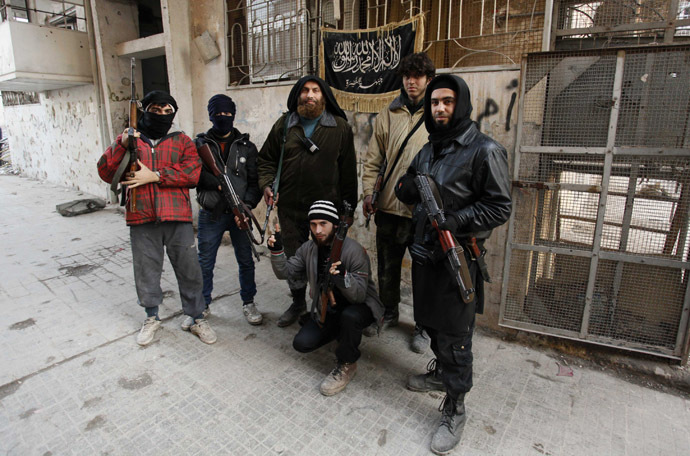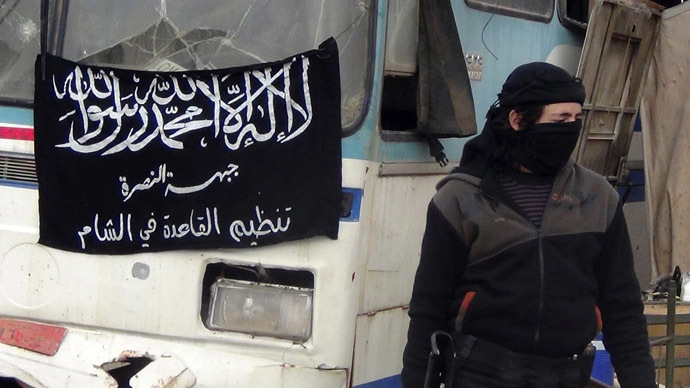British jihadists fighting in Syria have threatened to launch a terror attack in Britain in a mark of retribution against UK airstrikes in Iraq. They claim the attack would parallel the 7/7 London bombings and beheading of soldier Lee Rigby.
Reacting to Royal Air Force (RAF) missions that have struck Islamic State (IS, formerly ISIS/ISIL) militants, vehicles, and positions, a British jihadist based in the Middle East delivered an in-depth interview via social media on Wednesday.
He said that those who have travelled to war-torn Syria to fight in the region could potentially return to conduct attacks in Britain.
“Tell the Brit govt to withdraw unless they want the days of 7/7, and Adebolajo [to] become regular days,” he warned, referencing Michael Adebolajo, one of two young men who murdered Rigby in Woolwich last year.
Reflecting on the statement, senior fellow at the International Centre for the Study of Radicalisation (ICSR) Shiraz Maher, told The Times that the jihadists were claiming Britain “is putting itself in the firing [line] because of UK intervention.”
“This man is with a group of British fighters. I would classify him as one of the more moderate ones and yet this is what he is saying,” he added.
A separate IS militant, who hails from Coventry and has adopted the alias Abu Musab al-Jazairi, took to social media to warn Britons they would be held responsible for the actions of the UK government, the Times revealed on Thursday.
“To the people in the UK – because of the actions of your government it will be you who will pay the price, blame them and not us. Everything and everyone will be targeted, it is only a matter of time before it happens inshallah [God willing],” al-Jazairi said on Twitter.
His account has since been deactivated.
At least four British jihadists have lost their lives in Syria since a US-led coalition – assembled to tackle the Islamic State – began airstrikes in the region. France, America, and a number of Gulf states extended strikes from Iraq into Syria last week.

The Times reports three of the deceased Britons originally hailed from East London’s Tower Hamlets, which is populated by a vibrant Muslim community. They are thought to come from the borough’s Bangladeshi district. The fourth British casualty, Ibrahim Kamara, was a 19-year-old student from Brighton.
All of the deceased British jihadists in question were reportedly fighting with the Al-Qaeda-affiliated Nusra Front, which has battled stringently against President Assad’s forces, as well as IS.
Several of them initially embarked on a journey to Syria to carry out charity work but subsequently became involved with the Nusra Front, according to The Times.
A Nusra jihadist from Britain warned researchers from ICSR that it was “showdown time against the barbaric Yankees and their poodles.”
“I doubt if British ISIS supporters & loyalists planning to go to Iraq and Sham [Syria] would want to go now. They could start attacking all round the UK. Cameroun (sic) is a dumb puppy,” the fighter said.
“They should withdraw from the crusade before it’s too late...these guys aren’t afraid of death, the[y] rush towards it,” he added.
The British jihadist claimed the Nusra Front had no prior plans to launch an attack on the UK, but now seeks revenge unless British Special Forces withdraw from the Middle East.
He referenced the withdrawal of Spanish forces from Iraq following the 2004 Madrid train bombings as the most strategic path for the British government. He also warned that Western intervention in Syria is likely to drive a reunion between IS and Nusra, following their split earlier in 2014.
In response to the rise of IS in Iraq and Syria, the government raised the UK’s terror threat level from ‘substantial’ to ‘severe’ at the end of August.
MPs voted on Friday to join US, French, and Arab airstrikes against IS positions in Iraq, but not in Syria.
On Thursday morning, Royal Air Force (RAF) Tornados attacked an IS position in northern Iraq, and launched a targeted precision strike on an armed vehicle. The operation was allegedly carried out in support of Kurdish forces in the region, and was reported to be “successful” by the Ministry of Defence (MOD).

